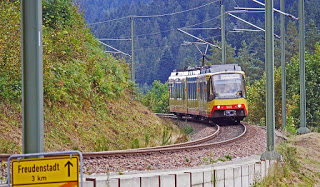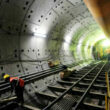The impact of the tram network on Nottingham’s economy
Whether it’s the new high speed rail link from London to the north or the Cross Rail project to help people cross the capital, it’s often said that big ticket infrastructure programmes serve to provide an economic boost to the area they serve and drive up the value of the homes of residents living there.
We can easily test this theory by looking to Nottingham. Last summer, two new tram lines began operation, adding to an existing line to make up a new network to serve the city.
Report hails £100 million economic boost
A recent report in the Nottingham Post noted that the £575 million extension to the tram network had indeed brought a significant boost to the economy.
The paper reported on an independent study that looked at the direct and indirect jobs that the project had brought at a time when the country was hit by a recession and such investment might have otherwise been in short supply.
It found that 1,600 jobs were created at the peak of the project and that the wider economy had been boosted to the tune of £100 million as a result of the scheme.
One of the report’s authors, Nottingham Business School’s Will Rossiter, told the Post: \”There are real lessons that can be drawn from this project about how major transport infrastructure projects can be used to deliver wider benefits for the communities that they affect.These lessons have never been more timely with major projects such as HS2 beginning.\”
House prices have risen
What, then, about the people not directly employed by the construction project?
Notts TV recently examined what had happened to the prices of homes within a short walking distance of the stops on the first line, which opened in 2004.
Its study showed that the impact had been dramatic. Some homes had even doubled in price across a decade – a time when the average Nottingham home only grew in price by less than £1,500.
David Thornhill, of the Nottingham Campaign for Better Transport, told Notts TV: “The main benefit of the trams is getting people to and from places of employment – so a tram is a top priority for any company who wants to relocate its business; Nottingham is ticking all the boxes and a good public transport system is good for companies and employees.
“Modern housing development and trams go hand in hand in Europe, but in the UK this is yet to come. But there is no doubt we are seeing a start of this in the Nottingham area.”
The ‘upheaval effect’ shouldn’t be ignored
It certainly hasn’t been plain sailing for the development of Nottingham’s tram network. The first line opened in 2004 – bringing trams back to the city after a 68-year absence – but it then took a number of years of political wrangling to agree the next routes to Toton and Clifton. From then, construction work overran, taking more than three years to complete once the first spades went into the ground in early 2012.
During this construction phase, a great number of residents grew fed up with the intolerable time added to their daily commute. Those overlooking the tram line in places such as Beeston even made the case that the presence of a tram line passing in front of their home had caused it to drop in value by as much as £40,000. For those people, the sort of property price growth experienced by Line One homes will be necessary to recover lost ground.
Practical and reputational value
The simple fact is, whether you are a business in Nottingham, a student, an employee or just need to travel for leisure the tram has practical value in providing new links across the city. Big centres of population such as Beeston and Clifton have been served, as has the University of Nottingham, Queen’s Medical Centre and business park NG2.
It also has a harder-to-quantify value, giving the city a reputational boost to outsiders, who may well consider such transport networks to be the hallmark of a forward thinking modern city.
While not everyone has shared the benefit equally, the experience of the first year suggests that the economic benefits are finally being felt.

















